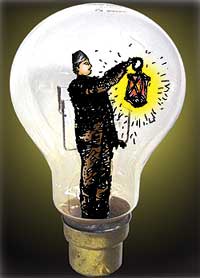 Is it just us getting a feeling of d?j? vu around here? Or do you also get that whiff of pre-1990 Nepal in the air? After 12 years, sycophants are again lurking in the shadows, the same mantra is chanted on the Radio Nepal morning news (even the national budget is crowded out as other rituals are read), there is the sight on daily television news of a familiar retinue stooping in a familiar routine, and national holidays everytime there is a state visit. It's all form and no content, and it feels like we have come a full circle.
Is it just us getting a feeling of d?j? vu around here? Or do you also get that whiff of pre-1990 Nepal in the air? After 12 years, sycophants are again lurking in the shadows, the same mantra is chanted on the Radio Nepal morning news (even the national budget is crowded out as other rituals are read), there is the sight on daily television news of a familiar retinue stooping in a familiar routine, and national holidays everytime there is a state visit. It's all form and no content, and it feels like we have come a full circle. Kathmandu can never do things in half-measure: it either goes for a self-serving, free-for-all politics and ruins the country in the process, or it swings to the other extreme and re-invites the debilitating paralysis of partylessness. It would be unfair to compare this bureaucratic vassalage, this knee-jerk kneeling, and feudalistic servitude just to the Panchayat. In fact, the antecedents of our chakari culture go back to the Rana regime and beyond.

Today's Nepalis deserve better than this. Was our evolution towards rule of law, pluralism and democracy so flawed that we have to swing back to a feudal Nepal of Percival Langdon? Is our self-esteem so low that we now wait for a second coming?
Nepal is not unique in this nostalgia for strongman rule. Most of the ex-Soviet bloc saw it in the 1990s when the democratic transition was so messy that, in a supreme irony, Stalinists were elected to power in free elections. Closer home, there are parallels in the untidy freedoms of post-Marcos Philippines and in Zia-less Pakistan.
The Nepali people are now sovereign, and yet we hanker for a saviour. It is partly cultural-the belief that divine intervention will set things right-and partly a deep-seated public disillusionment with what commoner politicians have wrought in the past decade.
But post-1990 freedoms have made Nepalis more astute and alert, they know why things are in a shambles and exactly who is responsible. They know the Maoists are not the messiahs they claim to be, but the people need a sign that their elected representatives can get their act together. Support for elected political leadership and parliamentary parties has never sunk as low as it has today.
Even so, the people are not ready to give up people power. They don't want to abandon the political mechanism of electing local leaders, a process that had finally begun to show results by delivering basic services at the grassroots.
True, at the national level, the stench of political gangrene was getting unbearable, but this is no reason to go back to 1960. The Maoists have reacted to this political failure with a violent attempt to overthrow the parliamentary multi-party system. If we do the same, then how are we different from them? The alternative to demagogues from the left cannot be demagogues from the right. Reform will not come hanging on the coattails of reactionaries, nor can it last without the people's support for long.
And yet, democracy is not so much in danger from those who are openly anti-democratic as it is from those whose sense of self-worth is so low that they are willing to consider that it is dispensable. The continuity and stature of our constitutional monarchy will be best served by the checks and balances of democratic pluralism. We tried strongman rule, it didn't work. Let us not go back, there is only darkness there.


